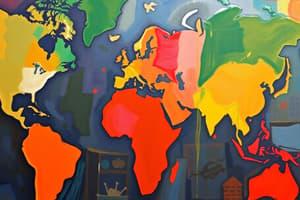Podcast
Questions and Answers
What is one of the main arguments made by social theorists about globalization?
What is one of the main arguments made by social theorists about globalization?
Which theory sees globalization as a form of a new ruling elite emerging?
Which theory sees globalization as a form of a new ruling elite emerging?
Why do critics argue against globalization?
Why do critics argue against globalization?
Which phrase characterizes globalization as debated in the content?
Which phrase characterizes globalization as debated in the content?
Signup and view all the answers
Which of the following is NOT considered a perspective on globalization by theorists?
Which of the following is NOT considered a perspective on globalization by theorists?
Signup and view all the answers
How do defenders of globalization typically view its effects?
How do defenders of globalization typically view its effects?
Signup and view all the answers
Which technology is often tied to the emergent global economy and culture?
Which technology is often tied to the emergent global economy and culture?
Signup and view all the answers
What aspect of globalization did some theorists see as a sign of progress?
What aspect of globalization did some theorists see as a sign of progress?
Signup and view all the answers
Study Notes
Globalization & Literature SETP - Fall Semester 2024
- Mansoura University, Fall 2024 course, covers Globalization & Literature
- Course includes topics of Globalization & Anti-Globalization Theories, and various perspectives on globalization
- The course will feature discussion of who is seen as figures for or against globalization.
- The course is likely about various perspectives to understand globalization.
Globalization & Anti-Globalization Theories
- Globalization is a complex issue with various interpretations
- Some argue it's like the laws of gravity, an inevitable force
- Others view it negatively, citing negative impacts on developing nations
- It’s debated if globalization is a positive force of progress or a tool for exploitation.
What Is Globalization?
- Globalization is defined as a trend of rapid economic, cultural, and institutional integration among countries
- Driven by trade liberalization, technological advances, and pressures for international standards
- The growth of globalization has been tied with the rise of technology and decreased cost of transportation.
- Globalization makes the world more interconnected but is also a source of much controversy.
Other Faces of Globalization
- Different perspectives on globalization include imperialism, Americanization, delocalization, multinational corporations, branding, and the widening gap between the rich and poor.
- These facets represent various ways that globalization is experienced across nations.
What is the Origin and History of Globalization?
- Globalization is a modern phenomenon, though its roots may be traced further back in time
- It appears to have become the primary buzzword in the 1990's, similar to postmodernism becoming a popular topic in the 1980's
- Globalization is a very controversial topic.
How Do Theorists View Globalization?
- Some theorists consider globalization a "network society" tied to technology
- Others view globalization as the triumph of capitalism
- Other perspectives view globalization as contributing to the rise of a new transnational ruling elite.
Why is Globalization a Controversial Topic?
- For some, globalization is code for global capitalism and imperialism
- Others believe it represents progress, increasing wealth, and freedom.
- Critics see it as exploitative and increasing economic disparities between rich and poor countries.
What is Globalization? (Different perspectives)
- Globalization is a process of rapid economic, cultural, and institutional integration among countries
- Driven by the liberalization of trade, investment, capital flows, technological advances, and the pursuit of international standards
- Globalization makes the world more accessible.
Types of Globalization
- Economic: trade between nations with few barriers
- Social: ease of information and idea sharing, access to internet & social media; including interactions between different countries
- Political: level of cooperation & agreements between nations
Causes of Globalization
- Trade liberalization: reducing trade barriers
- Improvements in Technology: easier communication and sharing of information
- Reduced cost/improvement of communications and transportation
- Deregulation of financial markets
- Increased significance of transnational corporations (TNCs)
Trade Liberalization
- Trade liberalization = reduction in trade barriers, leading to worldwide market opening
- Trade barriers have decreased since World War II
- Organizations formed to encourage trade integration, including GATT and WTO
Improvements in Technology
- Advancements in technology make communication and information sharing easier globally
- The internet is a significant contributor to this process.
Reduced Cost & Improved Transportation/Communications
- Lowering the costs of transporting goods & advances in communication = a major factor in globalization.
- This facilitates global trade and production processes.
Deregulation of Financial Markets
- Efforts to reduce restrictions on financial capital movement between countries
- Removal of capital controls to facilitate global operations of companies
Increased Significance of TNCs
- Increased economic power of transnational corporations since World War II, leading to their growth.
- Corporations seek favorable tax rates and easier access to markets.
Assignment
- Read The Power of Yes by David Hare.
- Be prepared for discussion.
Studying That Suits You
Use AI to generate personalized quizzes and flashcards to suit your learning preferences.
Related Documents
Description
Explore the intricate relationship between globalization and literature in this quiz. Engage with various theories and perspectives that illustrate both the positive and negative implications of globalization. Dive into discussions on significant figures who support or oppose globalization.




